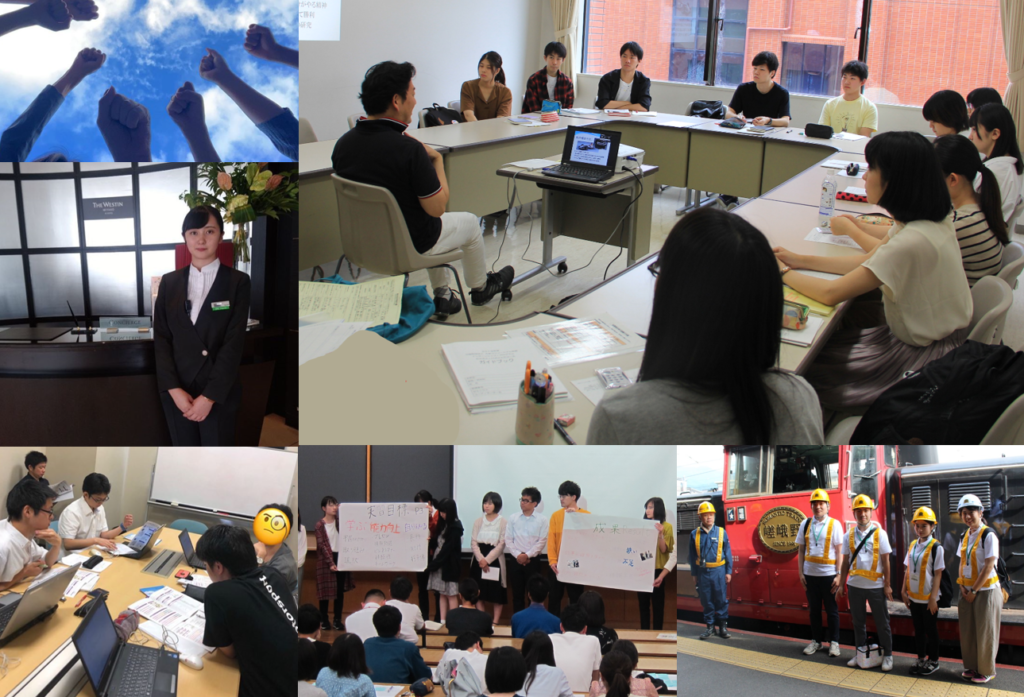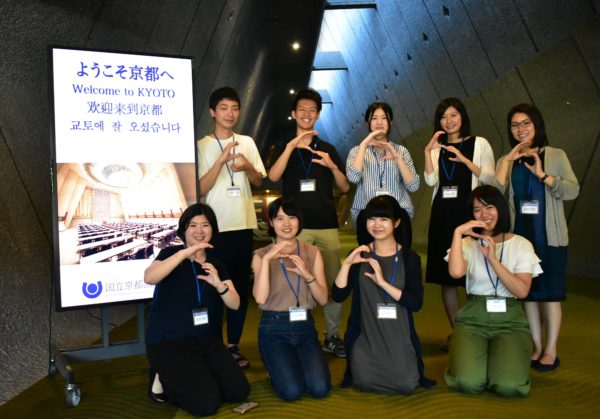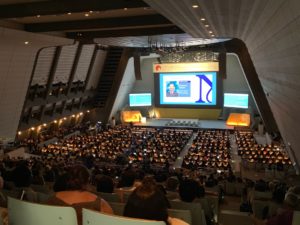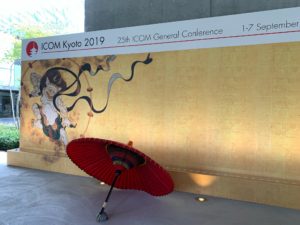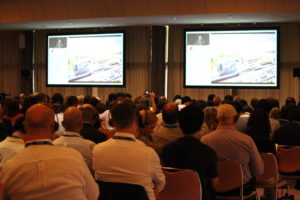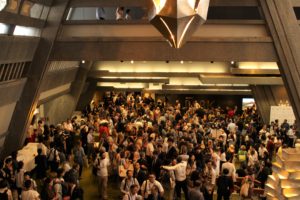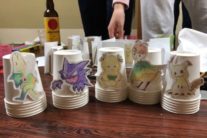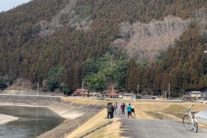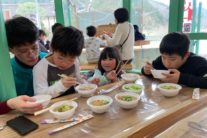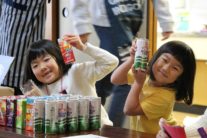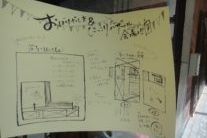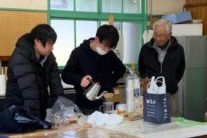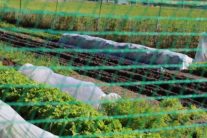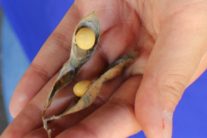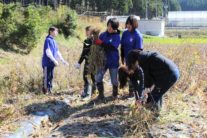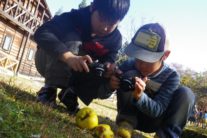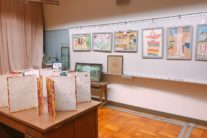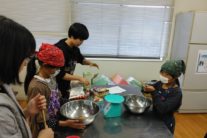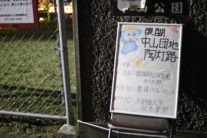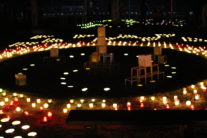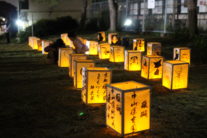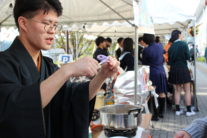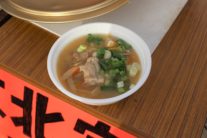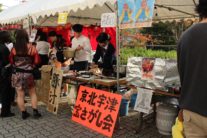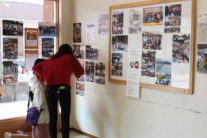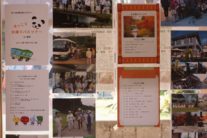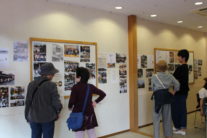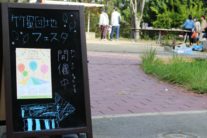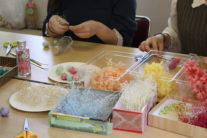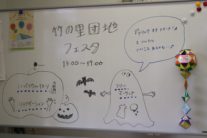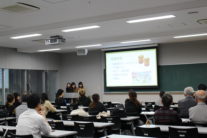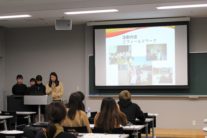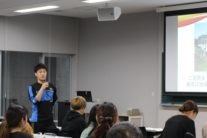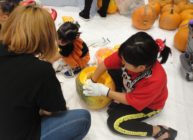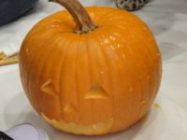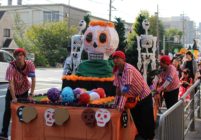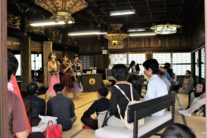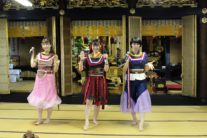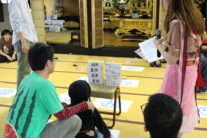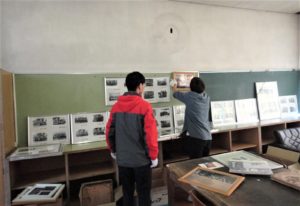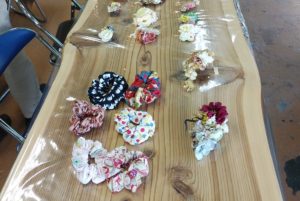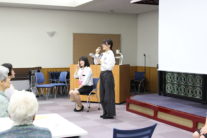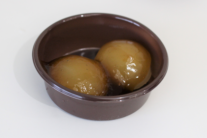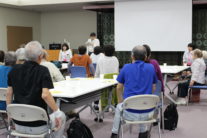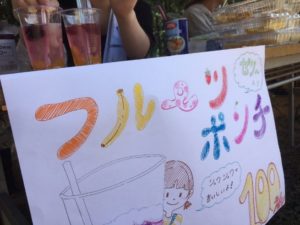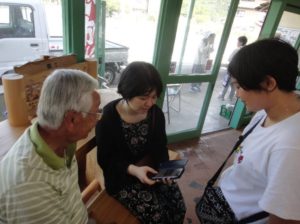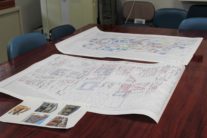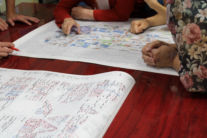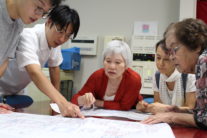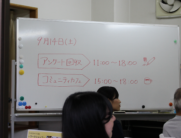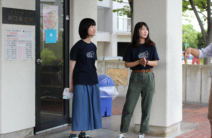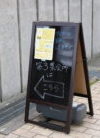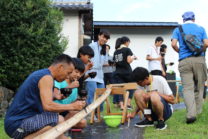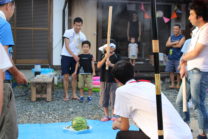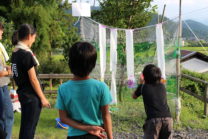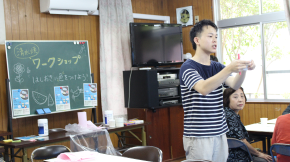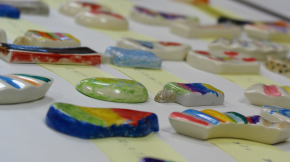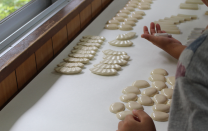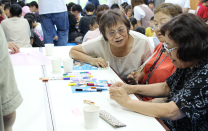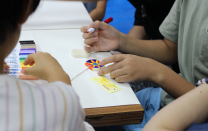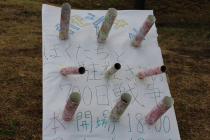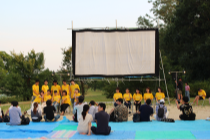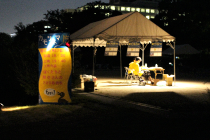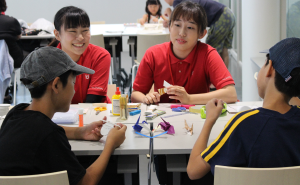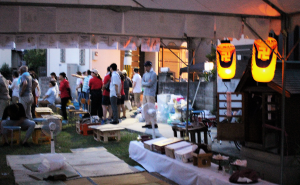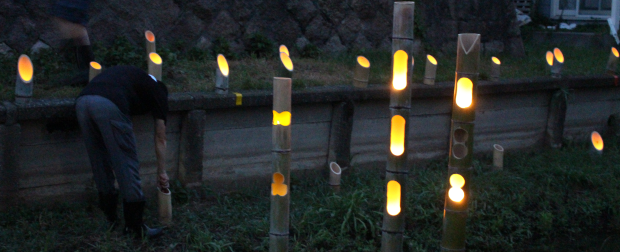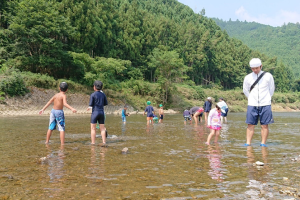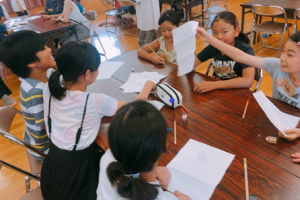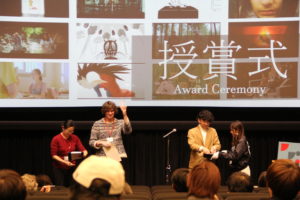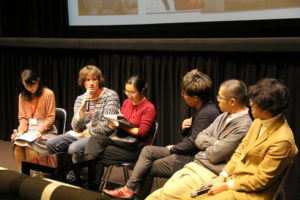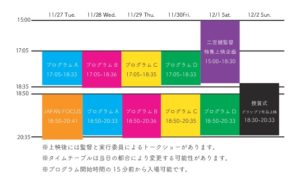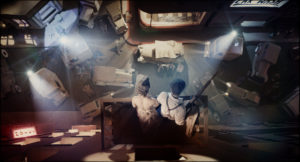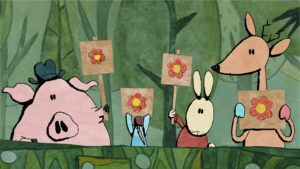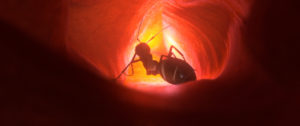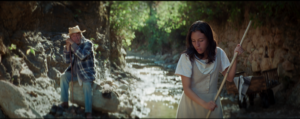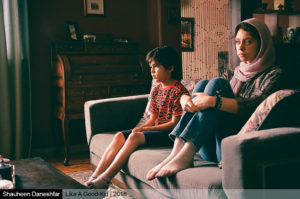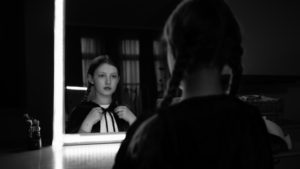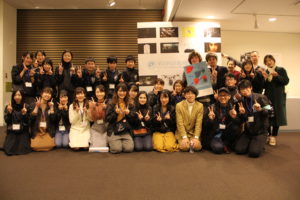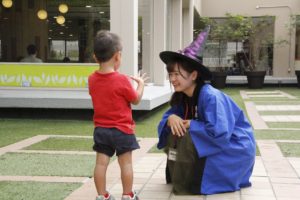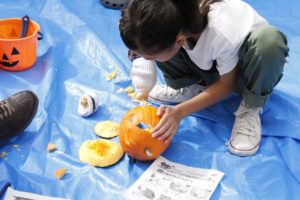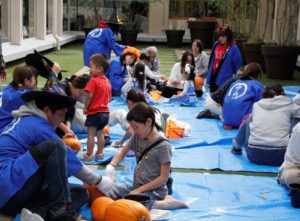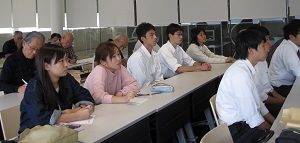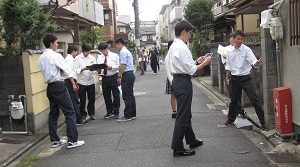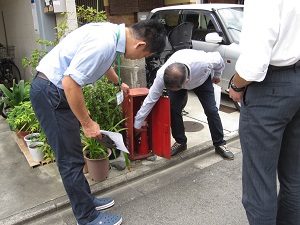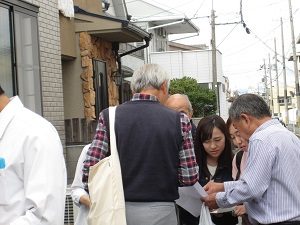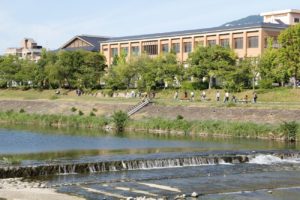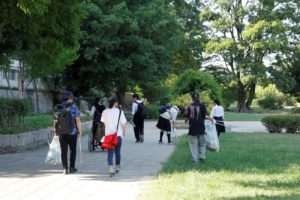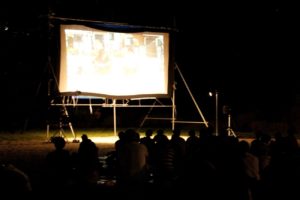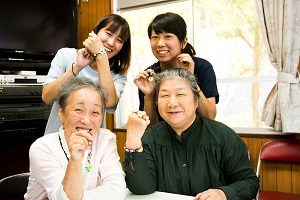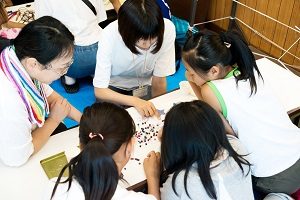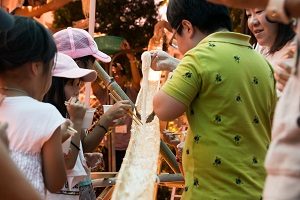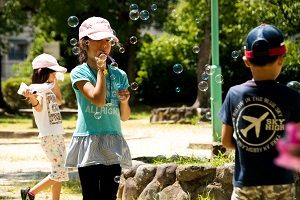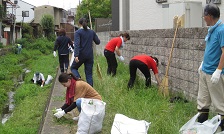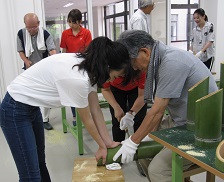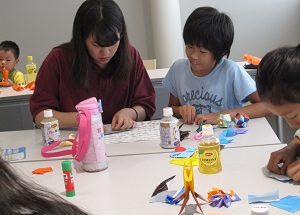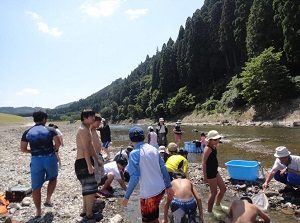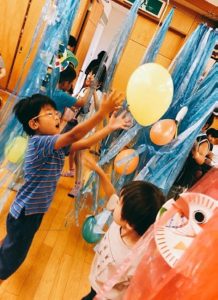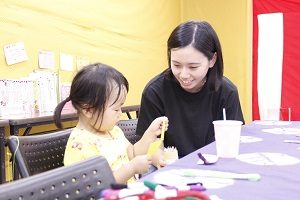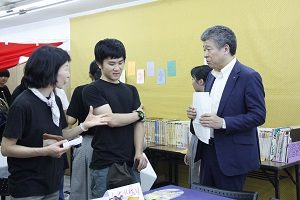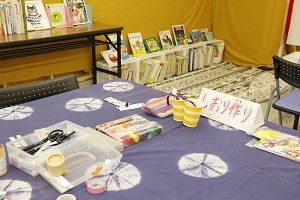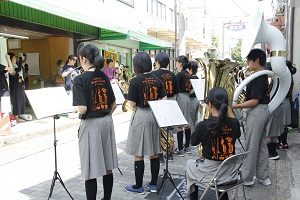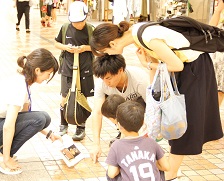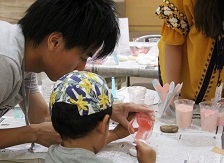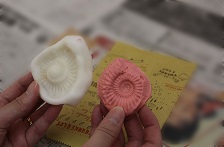Introducing the 2019 Gakumachi Collaboration Project initiatives.
In order to create attractive communities and solve local issues, the “Gakumachi Collaboration Project” invites universities and students to work on projects in collaboration with the local community, and provides grant support for outstanding initiatives. We would like to inform you of this year’s initiatives.
【Activities】Kyoto Seika University Keihoku Utsu Treasure Hunting Club (7th !!!!!)
We would like to introduce an activity report from a member of the “Keihoku Utsu Treasure Hunting Association”, which aims to revitalize the region through the search for local treasures (nature, people, technology, tradition, history, etc.) in the Uzu area of Keihoku-cho, Ukyo-ku, Kyoto City.
Click here for the report on participation in the event “New Year’s Gathering” sponsored by Ippukuya Uzu
【Activities】Kyoto Seika University Keihoku Utsu Treasure Search Club (6th !!!!)
We would like to introduce an activity report from a member of the “Keihoku Utsu Treasure Hunting Association”, which aims to revitalize the region through the search for local treasures (nature, people, technology, tradition, history, etc.) in the Uzu area of Keihoku-cho, Ukyo-ku, Kyoto City.
Smile Bazaar, Local Information Signboard Renewal Meeting, Morning Market Activity Report Click here for the report
Participation in the University Regional Collaboration Summit Activity Report Click here for the report
【Activities】Kyoto Sangyo University Mirai Transmission Bureau Omusubi ~Shizuhara Support Team~
On Saturday, November 9th, we visited the “Once Upon a Time Farming Experience Session No. 1” by the “Mirai Transmission Station Omusubi ~Shizuhara Support Team~”.
“Soikal from Shizuhara ~Dissemination of Kyoto Soybean Food Culture~” focuses on Japan’s important food culture “Washoku”, especially “soybeans”, which are the raw materials of yuba, tofu, and miso that are indispensable for Kyoto cuisine, and for the purpose of local production for local consumption of soybeans and the transmission of food culture, we will cultivate Kyoto soybeans “Otsuru”, hold events related to soybeans, and develop products together with the people of the Shizuhara area. We are engaged in activities aimed at disseminating the appeal of soybeans and improving their status.
At the “Once Upon a Time Farming Experience Session”, you can experience the harvesting ~ threshing of giant soybeans.
Before heading to the farm where you can experience harvesting, we were guided to the 1st ~ 7th farms in order, where we usually work. The members who guided us this time were first-year students, and they had only been active for about half a year, but while visiting each farm, they said, “It is difficult to make a furrow (a place where the soil is raised in a long and straight shape to grow crops in the field),” “We grow winter vegetables here,” and “We are considering other uses because it is shaded by the mountains and the sunlight is short and the drainage is not good.” He said that there were many things he didn’t know and that he still had a long way to go, but he explained it very reassuringly. Since they are active once a week, they seem to know each other in the community, and they exchanged greetings and talked lightly. The blue T-shirts they wear during their activities also seem to play a role in spreading the initiative.
When we arrived at the farm where we could experience harvesting, in addition to the members, international students from Kyoto Sangyo University also participated and were working. It is said that the harvest time for soybeans is when the stems, leaves, and pods turn brown and become dry. As the members told me, when I held the stem and pulled it, it came out smoothly and easily. This will be dried for a week, and at the second trial session next week, it will be threshed using a foot rowing threshing machine that was used in Shizuhara a long time ago.
In the “Shizuhara Miso Project” of “Soikal”, it seems that the seedlings of giant soybeans are distributed to people on campus and in nursing homes for the elderly, and they are growing. In February, we plan to hold a workshop inviting them to make miso using the Shizuhara method using soybeans grown by themselves. From now on, the first winter for first-year students is coming. I was a little worried when I heard that it would snow, but I hope you will do your best against the cold!
【Activities】Kyoto Seika University Keihoku Uzu Treasure Hunting Club (5th !!!)
We would like to introduce an activity report from a member of the “Keihoku Utsu Treasure Hunting Association”, which aims to revitalize the region through the search for local treasures (nature, people, technology, tradition, history, etc.) in the Uzu area of Keihoku-cho, Ukyo-ku, Kyoto City.
Elementary School Exhibition + Haunted House Preparation Activity Report Click here for the report
The 3rd University Student × Children’s Summit Activity Report
Children’s Photography Class Activity Report Report
【Activities】Kyoto Tachibana University Society for Contemporary Business Studies Urban Development Study Group (Part 2!)
On Saturday, November 2nd, we visited the “Daigo Nakayama Complex Pottery Lantern Road” by the Kyoto Tachibana University Society of Contemporary Business Society’s Urban Development Study Group!
This year’s third Pottery Lantern Road at the Daigo Nakayama Complex is operated by residents of the Daigo Nakayama Complex and students from Kyoto Tachibana University, and is held with the aim of promoting interaction among residents and promoting Shimizu ware, which is concerned about the shortage of the next generation of workers.
At the main venue, Daigo Nakayama Park, the students came up with a design based on the theme of “Akiiro”. On the east side of the park, fresh greenery was drawn, and on the west side, red and yellow maples and fallen leaves were drawn, expressing the arrival of autumn. In addition to the main venue, the meeting hall was designed with the image of a river and fish, and the front of the nursery school was designed to make use of the long road.
This year, it seems that people who live in a nearby welfare facility also came to see it, and I heard that some people can only see it from a car, so they ad-libbed and set up a lantern area in a place where it is easy to see even while riding in a car.
In the Yamashina area, it seems that pottery lantern events are held in two other places in addition to the Nakayama Complex, but among them, the candlelight stands out in the Nakayama Complex and is said to be beautiful. On this day, it was sunny, there was not much wind, and the air was clear, and it was a perfect day for the pottery lantern road. It seems that they have been making preparations, such as cleaning the entire Nakayama Housing Complex for a week, so it was really good to be surrounded by the weather.
At the main venue, there was a drum performance by nursery school teachers, a calligraphy performance by Kyoto Tachibana University students, and a brass band performance. There was also a stamp rally project to further enjoy the lantern road, and participants collected stamps from students dressed as Mario and other characters in each area. If you get all the stamps, you will also get a nice gift.
Visitors to the venue commented, “The weather is just right on the porcelain road at this time of year, so I’m glad to be able to take a walk and see beautiful things,” and “I’ve been looking forward to this event since I found out about it last year.”
If you are aware of this “Daigo Zhongshan Complex Pottery Lantern Road” for the first time this year, please look forward to next year!
【Activities】Kyoto Seika University Keihoku Utsu Treasure Hunt (4th !!)
On Friday, November 1st, I visited the “Food Stalls in Kino Festival” by the Kyoto Seika University Keihoku Utsu Treasure Search Association.
Normally, the “Keihoku Utsu Fureai Learning Together” is active in the morning market, summer festival, and music festival in the Uzu area, but on this day, they set up a stall at the school festival “Kino Matsuri” of Kyoto Seika University to promote the group’s activities.
The stall was selling pork soup with plenty of vegetables and candy.
When I went there, a member of the first-year student of the Faculty of Humanities was working as a store keeper, and he said, “This year, due to typhoons and weather, the harvest of vegetables in the Keihoku Uzu area was not very good, and I was afraid until the last minute to see ……if we would be able to secure vegetables to be used for pork soup.” With the cooperation of the farmers, they managed to sell pork soup with plenty of vegetables from Keihoku, such as radishes and Chinese cabbage. I also had it, and the fresh vegetables were very delicious and the amount was really Mr./Ms., so I was full.
When I asked him if there was any Keihoku origin for the candy, he said that there was nothing in particular (laughs), but he told me, “It’s inexpensive, the color is beautiful, and you can enjoy it for a longer time than you think.” Maybe it’s because they’re used to setting up stalls at summer festivals and music festivals. Why don’t you consider other organizations as candidates when opening a store at some event?
After this, Kyoto Seika University Keihoku Utsu Treasure Search Club is planning to hold a children’s photography class, and on Saturday, November 30, a parent-child smile collaboration event “Smile Bazaar 2019”.
“Nikori Bazaar 2019” has Mr./Ms. shops planned by Uzu children, ghosts and shiki, and it seems that anyone can participate, so please come and visit!
【Activities】Kyoto Bunkyo University Bus Tours
On Sunday, October 27th, I visited the “Bus Tour Photo Exhibition in Mukojima Festival” by Kyoto Bunkyo University Bus Tours.
The Kyoto Bunkyo University Bus Tours offers one-day bus tours about five times a year that can be easily participated in directly from their homes, with the aim of taking the elderly who have not gone out much and promoting interaction with the local community in Mukojima New Town, where the population is aging.
On this day, at the Mukojima Festival, which was held mainly at Mukojima New Town Center Square, we held a photo exhibition of the bus tours that we have conducted so far.
A total of 25 tour photos were on display, from the first Fukui tour in 2013, which started its activities, to the one on Awaji Island that was held on Tuesday, September 17 this year. The number of tour participants was well received, with about 20 people each time compared to the capacity of 25 people, and it was clear from the photos that they were having fun.
When we talked to the visitors, they were surprised! He has participated in all 25 sessions. He said, “I’m looking forward to the destination, but the most fun is to be able to eat there and talk with everyone about other things.”
While looking at the photos, a first-year member said, “There are many people who have lost their husband Mr./Ms.s and are living alone, and who tend to be confined, but after participating in the bus tour, they are gradually regaining their energy. He himself participated in the tour and seemed to have a lot of things to feel.
As a first-year student, he is the representative of this organization, and although he has only participated in the tour twice, he has a good grasp of the contents of the tour from the first to now, and he is worried about where to go next time. “It’s ……a place where you can go on a day trip just by bus, and you can take a reasonable amount of time at your destination,” he says, “If you go 25 times, you’ll run out of candidates. Since the participants are mainly elderly, there are many points to pay attention to, such as the fact that you don’t have to walk that much to enjoy and that there are few stairs. Even so, it seemed to be fun to have the participants remember their faces and talk to them, and to think about various things, and he was talking with people who often participate in the tour, saying, “After all, the next one is the Japan sea side ~?”
The grandchildren of the people who participated in the tour also came to see the Mr./Ms., and I thought it would be good to hold a photo exhibition like this.
In addition to where to go, there seems to be no end to thinking about gathering members, but it seems that we are moving forward little by little as we do it, so I am looking forward to future activities!
【Activities】Kyoto Women’s University Eriko Inoue Laboratory, Takenosato and Shinbayashi Team (Takenosato Edition)
On Saturday, October 26, the “Takenosato Complex Festa” was held at the meeting hall and plaza of the Takenosato Complex.
There was a flea market in the square, and events such as herbarium making and relaxation were held in the meeting place.
At the flea market, there was a club of residents and Kyoto Women’s University, and there was also a fishing pond for children to fish for handmade knick-knacks, used books, and paper bags. The children were curious, “What’s in it?” There are many children in the Takenosato housing complex, and they often participate in the monthly community café, and they talk to the students in a friendly manner. By the way, he secretly told me that the contents were stationery that was in the member’s house.
The housing complex festival is mainly organized by students, but the residents suggested that they try to make a herbarium at the community café held once a month. It seems to have been well received, and some people said, “It was fun, so it’s the second time.” When I talked to the residents, they said, “There are many people who live in the housing complex, but they don’t have much interaction with each other, so I’m very happy about this kind of opportunity, and I hope it will continue for a long time.”
Despite these voices, there is no visible interaction between residents, so students are conducting surveys to learn about residents’ opinions and needs. A member said, “Sometimes I have to worry about it, but I’m happy when the residents remember my face and talk to me.”
In December, they are thinking of a project related to disaster prevention and child-rearing, which has been requested a lot!
【Activities】Ryukoku University, Higashitakase River Environmental Protection and Jizo Bon Project Team (Part 2!)
On Friday, October 25th, I visited the “Activity Review Meeting with Local Residents” held at Ryukoku University.
On this day, 13 students from Ryukoku University Junior College, who are members of the project team, teachers, and less than 10 local people participated in a review meeting on the Jizo Bon and related activities held in August.
First, two groups of students gave a PowerPoint presentation, and then all the students reflected on their efforts one by one.
Many of the members were from other prefectures, and some of the students began to learn about “what is Jizo Basin?” In addition, in the course of planning and managing the program, many students felt the importance of looking at things objectively and from multiple perspectives because they felt the narrowness of their own perspectives and the difficulty of communicating with them, and they felt envious of the fact that exchanges were more active than in their own hometowns, and they felt the warmth of the local people.
Local residents also talked about how the Jizo Bon Project started, and their impressions such as “By joining the students, I was able to have the opportunity to learn about the area where I live again.”
In the community, disaster prevention activities will be held on Sunday, November 10, and the teacher commented to the students and talked about the importance of disseminating rules and knowing faces in the event of a disaster.
It seems that some of the students were able to find their dreams for the future by planning the Jizo Basin. Even if it wasn’t a dream, what I learned and felt through this activity will surely be useful after I go out into the world, and it was such a reflection meeting that I hope that I will make full use of it!
【Activities】Kyoto University of Foreign Studies Halloween in Saiin Executive Committee
On Sunday, October 20th and Sunday, October 27th, we visited the “Lantern Workshop” and “Halloween Parade in Saiin” organized by the Halloween in Saiin Executive Committee.
“Halloween in Saiin” by members of Kyoto University of Foreign Studies aims to deepen exchanges between local residents, shops, and university students through the overseas culture of Halloween, strengthen their ties with each other, and create a richer place for local children to belong, focusing on the large number of dual-income households. We are mainly active in organizing events related to Halloween.
On Sunday, October 20th, we held a pumpkin lantern-making workshop at AEON MALL Kyoto Gojo. It was very popular, and it seemed that the numbered tickets were distributed immediately. Many families with small children participated, and children were in charge of drawing faces on pumpkins, and many adults were in charge of hollowing out the contents of pumpkins and cutting out them with knives according to the draft faces. When it was completed, everyone was happy to take pictures. Some students told me, “It’s a great opportunity because you don’t get many opportunities like this!”
Members of the residents’ association also came to the venue and talked with the member students. There, we were able to listen to episodes from the beginning of the business, and when we went to talk about what we wanted to do, we were scolded…… And. The members who had such an experience are now fourth-year students, and they seem to be thinking carefully about what is important in regional cooperation, such as listening to each other’s stories and having a win-win relationship.
On Sunday, October 27, the main event of this project, a Halloween parade was held. On this day, the weather was clear and about 150 people participated in their favorite attire, such as Kiki the Witch’s Delivery Service and Mr./Ms. the Winnie. There were people waiting on the sidewalk with cameras, and it seemed to be enjoyed in various ways. At the finish line, on the special stage of the Kyoto Family, there was a performance by the Kyoto University of Foreign Studies Brass Band, which made the event even more exciting.
This year marks the fifth year of “Halloween in Saiin”. There were years when the parade was canceled due to rain, but it seems that it is gradually becoming more widely known to the local people. We look forward to the future!
【Activities】Seian University of Art and Design, Kyoto City University of Arts, Kyoto Tachibana University, Ryuganji Cultural Affairs Department Tera*Parumusu
On Saturday, October 19th, we observed a live music performance and workshop by “Ryukishiji Cultural Affairs Department Tera*Parumus”.
“Ryuganji Cultural Affairs Department Tera*Parumusu” is an organization that aims to convey the familiarity of Buddhist culture through idols based at Ryuganji Temple in Shimogyo-ku, Kyoto. With the aim of making the temple a place for local people to interact and passing on Buddhist culture, we hold events such as live music on the theme of Buddhism and explanations of scriptures by the priest as an opportunity to visit the temple on a daily basis.
On this day, we held a business trip live and workshop at Jokyoji Temple.
In the live performance, the three idols danced and sang sharply. The lyrics also include Buddhist terms, combinations of sects and founders, and a mother Mr./Ms. who watched the concert with her child said, “I thought it was just a live event, but I learned more than I expected.” There were audience members of all ages, from children to the elderly, but when they called out “Together~!”, everyone happily imitated the choreography and got excited.
In the workshop, we performed the introduction of Buddhism. Each square contains various items from the birth of Buddha to the introduction of Buddhism to Japan, and those who caught the “training” square actually did zazen. Both children and adults seemed to be able to have fun and become interested in Buddhism.
When we talked to the members, they said that although they gained a fixed fan base after being featured in the media, they still have to work hard to make it known to a wider range of people, not just a limited number of people, and to make it a daily occurrence for local people to visit temples! He was enthusiastic.
From the beginning of November, Ryuganji Temple will hold the “Super Ten Nights Festival” in honor of the “Ten Nights Ceremony” held at temples such as the Tendai and Jodo sects, and various events will be held. Please take this opportunity to visit the temple!
【Activities】Kyoto Seika University Keihoku Utsu Treasure Hunt (3rd!!)
We would like to introduce an activity report from a member of the “Keihoku Utsu Treasure Hunting Association”, which aims to revitalize the region through the search for local treasures (nature, people, technology, tradition, history, etc.) in the Uzu area of Keihoku-cho, Ukyo-ku, Kyoto City.
Elementary School Exhibition Preparation + Parent-Child Smiling Mother Mr./Ms. Meeting Activity Report Click here for the report
Ippukuya Utsu Morning Market Store Opening + Easy Smartphone Classroom Activity Report Click here for the report
【Activities】Kyoto Koka Women’s University KOKA ☆ Orange Supporters
On Saturday, September 21st, we visited the “KOKA ☆ Orange Salon @ Kyoto Koka Women’s University” by KOKA ☆ Orange Supporters.
In the “KOKA ☆ Orange Project ~Let’s support the “food” of the elderly and people with disabilities!~” by members of Kyoto Koka Women’s University, we believe that food support and oral frailty prevention (prevention of oral function decline) are important issues that should be addressed in the community, which will lead to the solution of nursing care problems. While conducting training to maintain the function of eating, they are working to spread the importance of this initiative.
About 20 elderly people participated in this year’s Orange Salon, and the program included a magic show, preventive exercise for long-term care & brain training, a talk from a dentist, gymnastics to train eating ability, and a lot of Mr./Ms. content.
The members were in charge of the entire program and the gymnastics and singing corners, and taught exercises that can be done while sitting, from neck and shoulder relaxation to mouth and tongue movements. The method of vocalization and singing was devised such as raising the pitch and lengthening the endings of words, and the participants trained their eating ability to imitate the students while trying their best to raise their voices.
During the break, “soft Japanese sweets” were served, and this time I had mitarashi dumplings. When I tasted it with a little excitement, the taste was just as delicious as the Japanese sweets I usually eat, and the texture was soft and easy to eat. This year, you will be participating in the development of a new product, and it seems that it will be completed soon, so I am very much looking forward to that as well.
The next KOKA ☆ Orange Salon will be @京都光華女子大学を予定されています on Saturday, November 9th. After that, it is scheduled to be held in January and March, so I hope that this initiative will continue to spread!
【Activities】Kyoto Seika University Keihoku Utsu Treasure Hunt (2nd!)
We would like to introduce an activity report from a member of the “Keihoku Utsu Treasure Hunting Association”, which aims to revitalize the region through the search for local treasures (nature, people, technology, tradition, history, etc.) in the Uzu area of Keihoku-cho, Ukyo-ku, Kyoto City.
Keihoku Music Festa Activity Report Report
Smartphone class first thing in the morning, Children’s Summit Core Meeting activity report Click here for the report
【Activities】Kyoto University Taji Laboratory Higashikujo Town Development Team
On Wednesday, September 18th, I visited the “Higashikujo Mapping Hearing (2nd Hearing)”.
In the “Map of Higashi-Kujo Memory” by the Higashi-Kujo Town Development Team of the Taji Laboratory, Kyoto University, the number of storytellers who know the history of the Higashi-Kujo area is decreasing due to the aging of the population, and in addition to interviewing and archiving the state of the city, local residents and people who will be involved in the Higashi-Kujo area in the future are working to create a “memory map” that can be used as the basis for the future image of the region.
In this hearing, we heard from three people who have lived in Higashikujo for many years.
Putting together a map of the 1960s and the present, I asked, “What was the road like around here, and what was this apartment like?” When I asked him about the details, he said, “There is a garden when you enter from this road, …… the kitchen and toilet are shared” and “Oh yes! The three of them talked about the past while remembering it. As the members listened to the stories, they thought about how many years it had been, and wrote down what they heard on the map one after another.
I was able to hear sights that I don’t see now, and I had a very meaningful time. The content is not all positive, but the members are working with the feeling that they must envision the future of the region after learning and accepting the facts of the past, and I hope that they will continue to cherish this feeling in the future.
After this, the Higashikujo Town Development Team will conduct further interviews, organize the information, and then actually create a map. I look forward to the completion of the “Map of Memory” and am very much looking forward to seeing how this map, which will serve as the basis for the future vision of the region, will be utilized.
【Activities】Kyoto Women’s University Eriko Inoue Laboratory, Takenosato and Shinbayashi Team (Shinbayashi Edition)
On Saturday, September 14th, we visited the “Community Café” held at the Shinbayashi Complex of the “Kyoto Women’s University Eriko Inoue Laboratory Takenosato Shinbayashi Group”.
In the “Circle-like Self-Government Activities in Rakusai New Town” by members of the Eriko Inoue Laboratory at Kyoto Women’s University, each resident was inspired by what they are good at and what they like, based on the need for “human relationships that can help each other in the event of a disaster” in the Takenosato Housing Complex, where there is no autonomous organization and the local community is diluted. They are working to tackle local issues through circle-like self-government. This year, in addition to the Takenosato Housing Complex, which is celebrating its sixth year, activities have also begun at the Shinbayashi Complex.
Community cafes are held every month at the meeting hall of the housing complex, and in September they were held on Saturday 14th and Sunday 15th. When I visited, three residents had already arrived, and the conversation seemed to be lively with the students. After that, several people came to visit.
When I talked to the members, it seemed that some of them did not understand at the beginning of the initiative, and they set up a place to talk with them many times, but now, after a few months, they are participating in the café and they say that they feel that they are making progress, albeit little by little.
In order to encourage as many residents as possible to participate, the handmade flyers were not only posted on bulletin boards in the housing complex, but also posted door to door. The next day, there was also a plan to make bookmarks using leaves at the café venue. Along with the preparations for the autumn reading season, I think that the exchange of residents has also progressed.
On Saturday, October 26th, it seems that a “Festa” will be held at the Takenosato Housing Complex. Flea markets and workshops are planned, and it seems that non-residents can participate, so be sure to go there!
【Activities】Kyoto Sangyo University, Ryukoku University Satomachi Festival Executive Committee
In order to create a place for interaction between Sato (Keihoku) and the town (in the city) and to revitalize the community, the “Keihoku Satomachi Festival” organized by the Satomachi Festival Executive Committee holds events such as summer festivals and Christmas parties in the Keihoku area, led by students and working people from the Keihoku area.
On Sunday, August 25th, I participated in the Satomachi Festival (summer festival)!
The venue of the summer festival is the Keihoku Satomachi Exchange Cafe “Koi Samuraku”, which is located at the end of the JR Bus Kaohsiung-Keihoku Line, about 10 minutes by car further north of Zhoushan. About half of the participants were local residents and half from the city. In addition to the executive committee members, high school students attending local schools were active as staff, and we were entertained by Mr./Ms.’s program with a lot of fun, such as somen noodles, shaved ice, watermelon splitting, bingo tournaments, and fireworks. The ayu that I received from my neighbors was also grilled, and everything I ate in the nature of Keihoku was the most delicious. The children had a great time shooting and yo-yo fishing made by high school students.
In preparation for this day, they have held two meetings a month, but it seems that they have devised a way to hold the meeting once each in Keihoku and in the city because they want people who live in the city to know about Keihoku and people who live in Keihoku to know the city.
In the Keihoku region, the birthrate is declining, the population is aging, and the population is declining. Some of the members of the executive committee were fourth-year members of society working in the local area, but most of my classmates said that they would leave their hometowns to go on to high school, university, or find a job. In such an environment, it seems that there are many people who participated in the Satomachi Festival when they were high school students who want to be involved in some way even after graduating and becoming university students or working adults, so I hope that they will continue to do so and that their thoughts will continue to spread.
In an environment rich in nature, I was able to have an experience that is usually difficult to do in the city, and I was able to have an Mr./Ms.. If you couldn’t participate this year, please join next year and experience the charm of Keihoku!
【Activities】Bukkyo University Waku Waku Laboratory
On Friday, August 23rd, we visited the “Children’s Science Classroom” by the “Waku Waku Laboratory” of the Hirata Seminar, Faculty of Education, Bukkyo University. Once a month, seminar students conduct science experiments for elementary school students in the Kitano shopping district, and are engaged in community development activities in collaboration with the local community with the aim of intergenerational exchange and creating a place for children to belong.
This time, at a children’s center near Bukkyo University, fossil replicas were made and experiments with static electricity were conducted. The theme was “Fossil Replicas, Let’s Play with Static Electricity,” and 30 children participated.
First, fossil replicas are made, and fossil molds of their own choosing, such as ammonites and trilobites, are poured with pink resin, which is often used in dentist tooth casting. When the children saw the replica, they were surprised, saying, “Is this real?” The children made it under the guidance of the students and happily showed each other the replicas of the fossils they had completed.
After making the replica, we experimented with static electricity using plastic tape in the shape of balloons and octopus legs. Unfortunately, on this day, the heavy rain had accumulated moisture and made it difficult for static electricity to occur, but all the children were rubbing the balloons with their sweaters with all their might, trying to somehow float the vinyl tape.
The students and children seemed to get along very well and had a lot of fun, and the space was very warm. I hope that the next “Children’s Science Class” will be blessed with good weather.
*This article was interviewed and written by Mr./Ms. Yamamoto, a third-year student at Doshisha Women’s University’s Faculty of Representation and Culture, Mr./Ms. Kurita, a third-year student at Otani University’s Faculty of Letters, and Mr./Ms. Kisaragi, a second-year student at Kyoto Bunkyo University’s Faculty of Social Sciences, who are participating in training at the Foundation as part of the “Internship Business Public Course” conducted by the University Consortium Kyoto Education Division in 2019.
【Activities】Kyoto Tachibana University Society for Contemporary Business Studies Urban Development Study Group
On Wednesday, August 21st, we visited the Shimizu Yaki Chopstick Place Painting Experience of the “Kyoto Tachibana University Contemporary Business Association Urban Development Study Group”!
In the “Daigo Nakayama Housing Complex Revitalization Project” by the Kyoto Tachibana University Society for Contemporary Business Studies, in order to promote Shimizu-yaki, a traditional craft in Kyoto, and to increase the number of opportunities for interaction between the elderly and local residents, mainly the child-rearing generation, in the Daigo Nakayama Housing Complex in Fushimi Ward, a lighting event using Shimizu pottery “Pottery Road” will be held, and the venue will be cleaned. We hold workshops on making accessories using Shimizu ware, which will be exhibited at events.
On this day, about 40 children from two children’s centers and several elderly people participated.
When the students’ explanations began, the children, who had been making noise, listened attentively. First, ask them to choose their favorite shape from several types of chopstick rests. The children seem to have fun picking up one by one, deciding which one to choose. Once you’ve decided which one to use, it’s time to start painting. Each of them drew their own pictures with serious expressions.
The children who were able to paint were happy to show it to the students, saying, “Look at it~”. Those who were able to do it early enjoyed their drawing time until others were ready. The elderly people were also working hard to paint while saying, “What to draw ~?”, and they showed each other what they had finished, and it seemed that they were returning to their childhood.
It was said that from noon, a project for children and the elderly to interact with each other will be held.
On November 2nd, the “Pottery Lantern Road” at the Daigo Zhongshan Complex is scheduled. Toward that, it seems that a general cleaning operation will also be carried out. One student said, “I participated in this activity because I wanted to do it myself after seeing last year’s lantern road!” I’m looking forward to the day.
【Activities】Ritsumeikan University Camo Cinema 15 Executive Committee
On Saturday, August 17th, we visited the outdoor movie screening of the “Camo Cinema 15 Executive Committee”!
“Kamo Cinema” was launched 17 years ago by students at Ritsumeikan University who were interested in the conservation of the Kamo River, which plays a major role in creating a landscape that is unique to Kyoto. In light of the fact that Kyoto is a city of students, we, the students, who will lead the next generation, have been holding cleanup activities and outdoor movie screenings every summer as part of our efforts to raise awareness of beautification and environmental conservation among young people, especially those of the same generation. This year marks the 15th year of this initiative.
On this day, there was a cleanup activity called “Pikakamo” from 3:30 p.m., followed by a daytime project for children such as Super Ball scooping and ring tossing, a talk show by Miss &Mr./Ms. Campus finalists from Doshisha University and Kansai University, and an outdoor movie screening in the evening.
In preparation for this day, they distributed pocket tissues for advertising at the Kamogawa area “Kamogawa Naryo 2019” and asked them to place flyers at shops near the venue. Some of the people with pocket tissues in their hands said, “I went there last year!!” and “Movie screening in Kamogawa!? Looks good!” It seems that there were some people who reacted.
This year’s film is “The 700-Day War between us and Mr./Ms..” In 1979, in a peaceful rural town, seven high school students who are addicted to pranks and a brave resident Mr./Ms. who stands in front of them are engaged in a prank battle. It was a movie that could be enjoyed by both children and adults, and was perfect for this time of summer. The Kamo River was still hot during the day, but as the sun went down, it became cooler, and the wind was very pleasant. I had a luxurious time.
The “Camo Cinema 15 Executive Committee” is scheduled to volunteer for the extermination of invasive species on Sunday, August 25. We hope that you will continue to convey the charm of the Kamo River and spread the importance of beautification and environmental conservation!
【Activities】Ryukoku University, Higashitakase River Environmental Protection and Jizo Bon Project Team
On Saturday, August 17th, we visited the Jizo Bon program of the “Ryukoku University-Higashitakase River Environmental Protection and Jizo Bon Project Team”!
In order to pass on the traditional events of the region to the next generation and to improve the environment of the Higashitakase River, which is the venue of the event, the project team of the Ryukoku University Junior College Department is working with the local community to clean up the river, plan and operate the “Jizo Bon Program,” and support disaster prevention activities and drills, with the involvement of high school students and others.
Jizo Bon is a traditional event held in the hope of safety in the town and the sound development of children, and the next day, the 18th, was the actual event. On this day, the students were working on “various projects that children can enjoy” such as making eco-bags, bamboo dragonflies, and bunbun sesame seeds to liven up the Jizo Basin. The students, who usually don’t have many opportunities to interact with children, were confused at first about how to interact with them, but they quickly got used to it and seemed to enjoy being with them while teaching them how to make it.
Along the Higashi-Takase River at the Jizo Bon venue, children and students were playing with water guns, and everyone’s smiles were shining. Two weeks before preparing for the Jizo Basin, they also conducted cleanup activities as usual.
This year marks the sixth year of this initiative, and it seems that the Jizo Basin, which until six years ago was only half a day, has become a two-day event with the participation of students, and there are more opportunities for people in the town to show their faces, and it seems that communication between residents and multiple generations is being born.
The teacher who supervised the students said, “It is important to know the background of one event and continue the activity, rather than just one event.”
In the evening, bamboo lanterns and fireworks were held as the eve of the festival, and many adults participated in the festival. The lights were very beautiful in the river at night when it was cleaned.
【Activities】Kyoto Seika University Keihoku Utsu Treasure Search Club
We would like to introduce an activity report from a member of the “Keihoku Utsu Treasure Hunting Association”, which aims to revitalize the region through the search for local treasures (nature, people, technology, tradition, history, etc.) in the Uzu area of Keihoku-cho, Ukyo-ku, Kyoto City.
Click here for the Children’s Festa Activity Report














